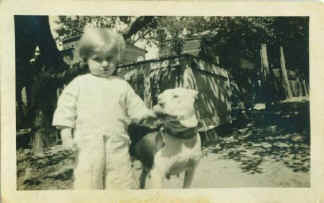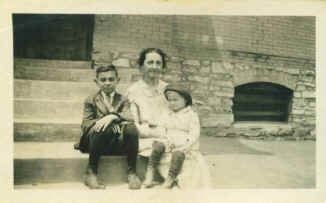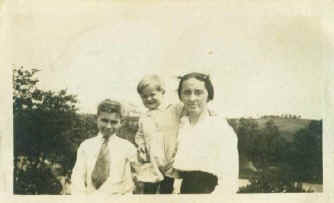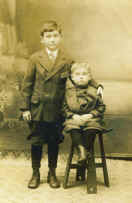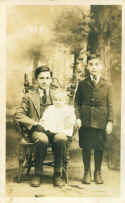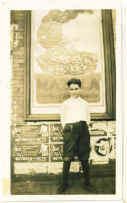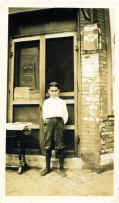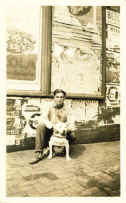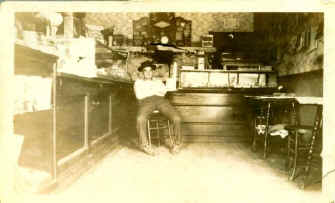This
is the Beginning of my Life Story
by Robert Fred Neubaum
(written
about 1987)
|
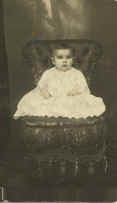
Bob as a baby
|
The
yellow moon was slowly rising over the eastern horizon about an hour after
sundown on the cold winter evening of January 20th in the year
of 1910 when I was delivered to my parents' home in the village of Enhaut
in Swatara Township in the county of Dauphin, state of Pennsylvania by
Doctor D. W. Schaffner, the village doctor who had delivered hundreds of
babies in this and neighboring villages during his years of practice. It
was he who had proposed the name Enhaut when it was necessary to change
the name of the town from Highland in order to obtain a U. S. Post Office
there for the first time. |
|
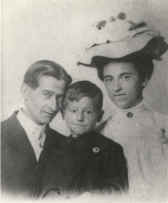
Bob's brother Bill with their parents
|
I
had a brother William who would be 8 years old about 4 weeks after I was
born. I evidently progressed normally from a helpless infant to a more or
less normal preschooler without too many memorable incidents, as the first
few years of my life are not remembered by me. My earliest recollection is
of my mother bathing me in the warmth of the large circular coal stove in
the dining room of our home and applying cocoa butter to my exceedingly
dry skin. |
I
recall that I was only a few years old when Vernon Grove, who lived back of us
on the next street, would come to our house to play with me on our kitchen floor
as the kitchen was the warmest room in the house and the center of all
activities for members of the family. The kitchen contained a built-in cupboard
from floor to ceiling, a coal range, a gas stove and a sewing machine, beside
which was a rocking chair where anyone could sit to read the daily paper. There
was also a kitchen table and four chairs where we ate all our meals.
We
had gaslights which hung from the ceiling in the kitchen, dining room and
parlor, which was the extent of the first floor. The second floor contained
three bedrooms where it was necessary to use kerosene lamps, as the gas pipes
did not extend to the second floor. Each bedroom contained a china basin and
pitcher placed on the "wash stand" and also a china "convenience
utensil" placed under each bed.
We
had no running water in the house, and water pumped at the outside well was used
for all purposes. The water bucket filled with cold water for drinking always
sat on the kitchen cupboards with a long-handled dipper in it for drinking or
ladling into other utensils for bathing or cooking.
Adjacent
to the back porch was a "summer kitchen" intended to be used for
cooking meals when it became too hot in the kitchen in the summer, but used
mostly for storage, as was the attic, which was accessed by stairs in the middle
bedroom. The lot upon which our house was built extended from Second Street to
Webb Alley at the rear. A large barn was at the end of the lot facing the alley,
where my father kept his horse and buggy and a flock of pigeons in the loft.
Between the barn and the house there was a chicken coop and chicken yard, an
outhouse, a pear tree and a small garden.
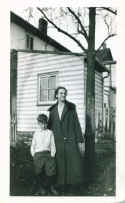 |
Charlie Neubaum with his Mother in back of their house at
669 2nd Street in Enhaut |
Our
street was a rutted dirt road with a path running along the fences of the houses
for pedestrians, which we all were at most times. The town had no streetlights
so it was best to be in the house before dark, although we were able to find our
way home from stores, churches or hotels at night.
The
trolley cars ran through our town from early morning until midnight at half-hour
intervals and were the main method of transportation for the residents of the
town, most of whom worked in Steelton or Harrisburg. The trolley cars were the
means of many excursions I enjoyed with my mother before I was old enough to go
to school.
One
event I remember was a visit to Uncle John Lilley, who was married to my
mother's sister Carrie and lived on Highland Street, not far from us. It was on
the occasion of his butchering of a hog he had raised in his backyard. The hog
was hung on a large tripod, head down, and killed and cut up. There were large
kettles of boiling water, and the saying was that "all of the pig was used
except the squeal."
Between
the ages of three and five, I went with Mother many places to visit relatives
and friends.
Trips
with Mother probably started with a trip to the company store at Front and
Locust Streets in Steelton where employees of the Bethlehem Steel Company
purchased food, staples, clothing, furniture and most everything they needed and
also paid their rent on the house owned by the steel company by charging it to
their account. On paydays this was taken off of their pay and, consequently,
some employees got no pay, when their purchases equaled or exceeded their pay.
A
later trip was to Harrisburg to shop at the Quarter Store (the official name was
Soutter's 25, 50 and $1.00 store) at 215 Market Street); Kauffman's Department
Store on Market Square; and Dives, Pomeroy's and Stewart at Fourth and Market
Streets, where we liked to watch the little carriages on wires that were sent
from the various counters to the store cashier, and change was returned to the
counters in the same manner. Later Pomeroy's installed a pneumatic tube system
to accomplish the same thing, as all money had to be sent to the cashier.
It
was the custom for many people in Enhaut, when going to Harrisburg, to walk the
mile to Steelton to save the 6 cents extra fare from Enhaut and also to get to
Harrisburg more quickly by way of Steelton trolleys, which went directly up
Cameron Street, whereas the Oberlin Trolley, which came through Enhaut, used a
more circuitous route to Harrisburg.
I
remember a trip by way of the Steelton trolley to Market Square in Harrisburg
and then the 6th Street trolley to 6th and Division
Streets. From there, we walked over the pedestrian bridge over the Pennsylvania
Railroad from 7th and Division Streets into Wildwood Park and up
Crooked Hill Road to Mother's cousin, Harvey Eslinger, and his family, who lived
at the top of Crooked Hill Road.
Most
of our trolley trips entailed a lot of walking after the end of the trolley
ride. However, one visit to another Eslinger family on Wiconisco Street in
Harrisburg was luckily close to the trolley line on 6th Street.
Another
trolley trip we took the Steelton trolley to Harrisburg, changed at Market
Square where all the lines converged, transferred to the Rutherford trolley,
which went to the end of Derry Street. From there we walked over the bridge
across the Reading Railroad yard and up Mushroom Hill Road to Chambers Hill,
where a friend of Mother's lived, Mrs. Aaron Keim (nee Ada Shuey). Later, when
they moved to a farm near Middletown, we took the Middletown trolley to
Middletown and walked several miles to their farm.
On
another occasion we wanted to visit Mother's sister Carrie and her husband John
Lilley, who had moved to a farm near Belle Grove, north of Annville. We took the
Hummelstown trolley from Harrisburg and changed to the Hershey Traction Company
trolley from Hummelstown to Annville and then walked about 5 miles out to the
farm.
Later,
my Aunt Carrie died at the farm, and Uncle John and their three small girls,
Mildred, Mary and Irene, lived at our house until they could relocate in
Shiremanstown.
|
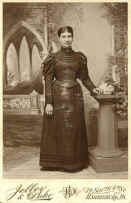
Louisa Steffy (Grossmom) as a young woman
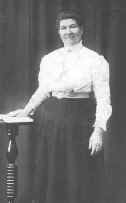
Grossmom in later years
|
Another
trip we took, we walked to Steelton, took the Middletown trolley to
Middletown, and waited at the Middletown Railroad Station for a train to
Bainbridge to visit my Grandmother (my father's mother) Louisa Klode
Neubaum Steffy, who had married Simon Steffy after being a widow for many
years. Since she had come from Germany, we all called her
"Grossmom."
While
we were waiting for the train to Bainbridge, a fast train passed by
without stopping, and I got a cinder in my eye from the smoke of the
train. This train was called a "flyer" since it only stopped at
major cities and traveled much faster than the local trains, which stopped
at every station.
I
remember standing in the back yard of the Bainbridge house waiting for Mr.
Steffy to come home with his horse and wagon, as he was a rural mail
carrier who delivered mail daily to the outlying farms on the Bainbridge
rural route. |
One
day my father told me that he had bought me a bicycle in Harrisburg, which would
be delivered on the 8:45 trolley car the next morning. This trolley also brought
the mail to the Enhaut Post Office. I got up at 6 a.m. the next morning, went to
the trolley stop across from the firehouse and watched every trolley arrive each
half hour from then until 8:45, when the motorman handed down a brand-new blue
and white 14" bicycle from Bogar's Sporting goods Store on Market Square,
where the gas company later was, and the City Government Center is now.
I
pushed the bike from the trolley stop to our house and proceeded to try to learn
to ride it on the street in front of our house. A small group of boys gathered,
giving me all kinds of advice on how to ride, even though they'd never had a
bicycle and knew less about it than I did. I finally was able to keep my balance
and ride, and I rode this bike for a number of years, until I got too large for
it, and I traded it to someone for a larger bicycle.
About
this time, my father also took me to a movie one Friday or Saturday night at the
Victoria Theater at 3rd and Market Streets in Harrisburg, where,
after the movie, a man named Zeke Beck came on stage with a presentation he
called "The Country Store." He would call out ticket numbers and give
out prizes. I was fortunate enough to have a winning ticket number and receive
an Easter Basket filled with chocolate eggs and bunnies. Although this was
probably the only movie I saw until I was a teenager, I don't remember anything
about the movie, only about Zeke Beck giving out prizes.
The
next day I decided to give the Easter Basket to a girlfriend, Florence Baughman,
who lived 5 blocks up the street. I walked from home carrying the basket by the
handle and got to the house next to the one she lived in, when the bottom fell
out of the basket, and all the candy landed on the ground. The lady next door,
who was evidently watching me come up the street with the basket, rushed out and
helped me pick up the candy and dust if off. I don't remember how I carried the
basket and candy in, but I gave it to her.
I
started school in the Enhaut schoolhouse next door to our house when I was 5
years and 8 months old. I was allowed to do that because I would be 6 before the
school term ended.
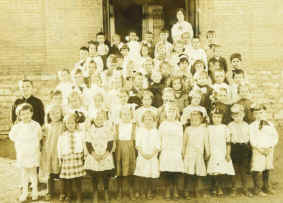 |
Bob Neubaum in 1916 (probably 1st grade)
(2nd row, 2nd from left) |
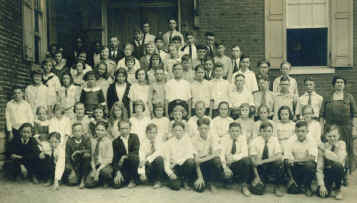 |
Bob Neubaum in 8th grade
(in front row, 4th from left in dark colored shirt with tie) |
My
1st grade teacher's name was Faith Page, who had a sister teaching
another grade in the same building. When I was in the 1st grade
(1915-16), automobiles were a rarity. Buses were an even greater rarity. An old
gentleman from Harrisburg had a bus called "Pappy Boyer's Joy Giving
Bus." He would come to the school and take a class of kids on his bus to
Reservoir Park for a day's outing, then bring them back to school. I only got to
ride on it one time. It was probably discontinued shortly after that. He looked
like Colonel Sanders of Kentucky Fried Chicken fame, with a white goatee. I was
surprised to see his picture in a book I have of the history of Harrisburg. In
it he has a 3-wheeled tricycle which he could ride kids on the back of. [This
picture is on page 66 in Life by the Moving Road: An Illustrated History of
Greater Harrisburg by Michael Barton, 1983] Later, he got the bus. [There is
a picture of the bus on page 85 of Steelton, Pennsylvania: Stop - Look -
Listen by John B. Yetter and Harold L. Kerns.]
My
school years from 1st to 4th grade were uneventful;
however, in 4th grade I remember our teacher, Ann Stroup, made me
stand in the corner one day for some infraction of a rule. I don't recall what
it was. When I got to high school I found Miss Stroup teaching commercial
subjects, but I never took a commercial class in high school.
Mr.
Guy Shumaker, who taught 7th grade, was the Principal of the
building. It was his practice to advance students with the highest marks to the
8th grade at the midterm; thus, in effect, having the students skip a
grade.
When
I was in the 5th grade, the Supervising Principal came to the
building, looked over the marks of the pupils in 5th grade, and
suggested to our teacher, Mrs. Coover, that some of the students with higher
marks could be advanced a grade, but she refused to do that, saying she didn't
believe in that. So I thought perhaps when I got to 7th grade, I
could possibly skip to 8th in Mr. Shumaker's class, because I was
tied for 1st place in the class with Bernice Keim in the 6th
grade. However, in 7th grade Mr. Shumaker was sick a good part of the
year, and we had a substitute teacher, so there were no promotions except at the
end of the year, when everyone was promoted.
|
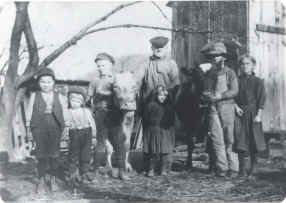
Uncle Gustav Neubaum with children and cows
|
I
delivered papers, both morning and evening, in Enhaut for a number of
years while I was going to school and also delivered The Grit each
Saturday. I got 2 cents for each Grit I sold for a nickel, and I delivered
it all over Enhaut and part of Steelton, as far as the West Side of
Steelton. My first stop in Steelton with The Grit was my father's Uncle
Gus Neubaum's poolroom on Front Street, opposite the Baldwin Firehouse. At
the end of the route on the West Side, I would walk up the hill to
Harrisburg Street and ride the trolley car back to Enhaut. |
Being
promoted to the 8th grade meant that we had to walk 3 miles to attend
school in Oberlin. The 8th grade class in Oberlin had pupils from
Enhaut, Bressler, Oberlin, Chambers Hill, Rutherford Heights and all other parts
of Swatara Township, so that we met quite a few new persons, and it was there I
met my future wife, Evelyn May Frantz from Bressler.
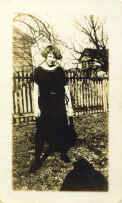 |
Evelyn May Frantz from Bressler about age 15 (1924) |
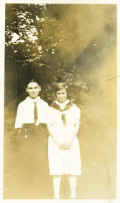
|
Bob and Evelyn |
When
I was about 8 years old (1918), my father, who was a machinist at the Bethlehem
Steel company, left this job and moved to Camden, New Jersey, to work in the
shipbuilding industry because of higher wages. Not long after he went there,
World War I ended, and the shipbuilding industry declined. He then worked in a
small machine shop called Morton's Machine Shop until work became slack there,
too.
|
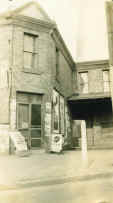
Fred Neubaum's store in Camden, New Jersey |
He
then purchased a store on Kaighn Avenue. It was a combination cigar, candy and
ice cream store which also sold newspapers and magazines. He later moved the
store to the intersection of Haddon Avenue, Mt. Ephraim Avenue and Lime Street.
When I finished the 7th grade in school, he asked me to come to
Camden to tend the store while he went to work at an outside job, since the
income from the store was not sufficient. He gave me instructions on how to
arrive there: by train from Harrisburg to Philadelphia, by subway from the train
station to the ferry landing, by ferry across the Delaware River to Camden, and
by trolley car to the location of the store. When I arrived, my father sent me
alone to a restaurant about a block away, and it was then I had my first
restaurant meal. They served me soup, and I ate the soup and got up to leave.
The proprietor told me that wasn't the entire meal, so I sat down and had the
rest of the meal.
|
For
the entire summer vacation I clerked in the store during the daylight hours
while my father worked at a machine shop, coming home in the evening to take
care of the store until it closed at 11 p.m. Each evening at 11 o'clock the
telephone would ring, and a voice would say "Breyer's calling," at
which time we would give our order for the various flavors of ice cream to be
delivered the next day by horse and wagon.
The
next day the ice cream would be delivered, placed in the ice cream cabinet and
chopped ice poured over the cans of ice cream. This had to be stomped down with
a club about the size and shape of a baseball bat to pack it around the cans to
keep the ice cream from melting. Salt was also sprinkled into the ice to cause
it to melt, and the ice water was colder than the ice itself…so the ice water
would keep the ice cream from melting.
There
were 2 telephones in the store because there were rival telephone companies--the
Bell and the Keystone. The same situation existed in Harrisburg, and subscribers
to one telephone system could not contact subscribers of the other.
At
the same time I applied to the P. L. Kempf General Store in Enhaut for work as a
clerk. I was 13 and a half. I had to wait until my 14th birthday in
January to be hired, as a certificate from the school was needed to work. I
applied to the school as soon as I reached 14 years and was issued a work permit
and was hired at the store. My duties included sweeping the floor, waiting on
customers and delivering grocery orders to people's homes. I worked in the store
from right after my birthday for almost a year, during the summer, but not the
next school year.
|
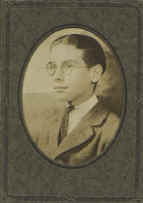
Bob in 8th grade
|
Since
the 8th grade school in Oberlin was a class that integrated the
pupils from about six grade schools, we had an opportunity to meet many
more classmates than we were associated with in the seven grades in Enhaut
School. This gave me an opportunity to make many new friends and arrange
for Sunday afternoon walks from Oberlin to Chambers Hill Road with several
girls with whom I developed a platonic friendship. I had a camera which I
had gotten from my father's store in Camden, New Jersey, and was an avid
picture taker. We also had evening hikes from the Oberlin School to
Chambers Hill, in which the whole class participated. |
I
was always interested in new families who moved to town and interested in the
places they came from. I remember the Holly family who moved to Second Street
next to the Dickey family, and the Hallman family who moved in across the street
from them next to the Gluntz family. The Holly's had two daughters of school
age, while the Hallman's had two sons and two daughters.
While
working at Kempf's I had to deliver an order to Mrs. Love on Third Street, who
had just moved there with her daughter Helen to live with Mrs. Love's mother,
Mrs. Glaser. I found that they had come from Pendleton, Oregon, which seemed to
me to be an exciting place. They had an annual Pendleton Roundup Rodeo, and I
formed a friendship with Helen Love when she entered my class in school in order
to learn more about that faraway place. I also met Alice McCahan, whose family
moved here from Steelton and resided in Webb Alley. I also met Jane Kautz from
Hummelstown, who visited the Kline family on Second Street every summer as I
delivered The Grit there. [Jane became Bob's second wife, after Evelyn died in
1986.]
While
working at Kempf's Store one day, I was slicing lunchmeat on the large slicer
which had a large slicing wheel with a razor-sharp edge all around. Suddenly I
heard a scream and saw a young boy run crying from the store and up the street.
Anna Kempf, who was in charge of the store, ran after him to his home and found
that it was Glen Thumma who had climbed up on a radiator and touched the turning
cutting wheel. His finger was nearly severed and was just held on by the skin.
He was rushed to a doctor who was able to stitch his finger together, and I
believe he regained the use of it. When asked why he had touched the cutting
wheel, he said he wanted to see if it was sharp. I had no idea that he was even
in the store at t the time. I believe he moved to California after finishing
school, and I was told that he became a doctor there.
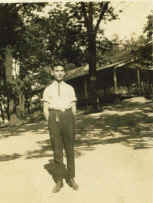
Bob at Paxtang Park
July 13, 1925 |
I
then purchased a paper route for the Harrisburg Evening News and The Patriot.
Using my bicycle and a paper bag slung over my shoulder, I would deliver The
Patriot before school in the morning and The Evening News after school in the
evening. It was the practice in those days for a paper route to be owned by a
person as an independent business, and they could sell it to another person. The
carrier had to collect the money from the patrons once a month and pay the
newspaper company the bill they would send him for the number of papers he
received that month. I don't remember what the margin of profit was. I
squandered the money I made on ice cream, candy and going to Paxtang Park, which
had a lot of amusements just like Hershey Park, which was too far away. We could
walk to Paxtang Park through Oberlin.
|
My
brother Bill had sold The Grit, then I took it over from him, and my brother
Charles took it over from me.
When
I was 15 1/2, Orville Akens and I went to the Devine and Yungel Shoe Factory in
Harrisburg to apply for work during the summer, and they asked my age. I said 15
1/2, and they said they couldn't hire me because you had to be 16. They asked
Orville Akens, and he said 16, although he was 15 1/2, the same as me. He was
hired, and I wasn't.
Then
I got a summer job at the Hershey Creamery ice cream plant on Cameron Street in
Harrisburg, and Evelyn Frantz got a job there also. Our job was to take the
hulls off the strawberries by hand. We were paid 25 cents for each five-gallon
can we filled. We each filled about 4 cans a day so we made about $1 a day.
Evelyn ruined a couple of dresses with strawberry juice, and I think the job
cost her more than she made. She quit, and I stayed there the rest of the
summer.
After
the strawberry season, I worked on a can-washing machine which washed
five-gallon ice cream cans by steam on a circular thing the steam squirted up
into. I had to wear gloves to keep from burning my hands. From there they put me
in a freezer wrapping ice cream bricks by hand. The temperature in there was
nearly freezing, so I went from the hot job to the cold job. For a short time I
had a job filling Dixie Cups. I think they came down a belt, and we had to stand
at the belt and put the tops on the Dixie Cups as they were filled.
This
doesn't seem right…I had more summer jobs than there were summers:
1
summer - Kempf's Store - 8th grade
1
summer - ice cream plant
2
summers - Elliot-Fisher Typewriter Company on Cameron Street in South
Harrisburg opposite Cameron Parkway. There was a park across Cameron
Street called Cameron's lawn (it was the old Cameron Estate). Evelyn
worked there one summer, too.
Then
I got a summer job at Paxtang Park in the park restaurant selling hamburgers,
hot dogs, ice cream and soft drinks. There I worked 12 hours a day, 7 days a
week and was paid $1 a day. I had to carry my lunch in a brown paper bag because
the restaurant owner said, "If you worked in a clothing store, the man
wouldn't clothe you, so why should I feed you just because you work in a
restaurant?" Walter Porter was the owner of the restaurant, and he promised
me a raise in pay which he never gave me so I quit before the summer was over
and hitchhiked to Toledo, Ohio to visit Aunt Margaret (Thompson) and her family.
From Toledo I went north to Detroit, crossed the river into Ontario and
hitchhiked across Canada to Niagara Falls, and home from there.
I
recall several highlights of my hitchhiking trip to Toledo, Ohio. Shortly after
leaving Harrisburg, I was picked up by 3 young Jewish men in a Model T Ford and
taken by them all the way to Pittsburgh. The route was via U.S. Route 30, which
crossed the seven mountains between Harrisburg and Pittsburgh. They were on
their way to Chicago, but due to the descent of the seven mountains and the
excessive use of their brakes, they had to stop in Pittsburgh for auto repairs.
They were kind enough to provide me with a hotel room, and the next morning I
struck out on my own. After getting several short rides into Ohio, I was picked
up by a farmer and his wife, who took me to their farm for dinner, after which I
continued my journey. I reached Toledo on the third day after leaving home in
Enhaut.
Eventually
I reached 4152 Westway in Toledo and stayed several days with Aunt Margaret,
Uncle Charlie and their family. I stayed there for several days. One evening
Uncle Charlie Thompson took us all to a festival where he treated us to ice
cream and soft drinks. I believe it was held on the sidewalk at a church. A
popular soda at that time was an orange-flavored drink called
"Whistle," which we all got. One of the Thompson children asked what
kind of soda it was, and Uncle Charlie answered "Whistle." Lois, who
was about 5 years old at the time, said in a loud voice "Is mine whiskey
too?" to the amusement of everyone around.
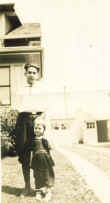 |
Bob with Lois Thompson at 4152 Westway in Toledo, Ohio |
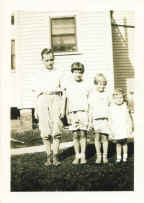 |
The Thompson Children: Meade, Peggy, Phyllis and Lois |
After
leaving Toledo to start for home, I went north to Detroit, crossed the river to
Windsor, Ontario and proceeded to travel east across Ontario. I reached London,
Ontario, one evening at sundown in a heavy rain. To keep dry, I went into a
poolroom and watched some men shooting pool. One man, noticing the knapsack I
was carrying, asked me where I was from and where I was going. Finding that I
had no place to spend the night, he offered to take me along to his home. When
we arrived there, he gave me a blanket and allowed me to sleep on a settee on
his enclosed porch. When I awoke the next morning, his wife fixed me a
breakfast, and, after eating, I was on my way again.
The
next night I arrived in Buffalo, New York. Again having no place to stay, I got
into a conversation with the attendant at an all-night garage where many people
stored their cars overnight. He allowed me to sleep on the back seat of a
Cadillac that was stored there for the night. When his time was up in the
morning, he woke me and took me along home with him to his apartment, where his
wife prepared breakfast for us. He told me his last name was "Hate"
and asked if I could guess how it was spelled. I couldn't so he told me it was
spelled "Haight." It's odd, but I didn't get the names of any of my
other benefactors except that one of the young Jewish men answered to the name
of Manny.
Leaving
Buffalo, I traveled south into Pennsylvania. When I reached the village of
Blossburg, PA, I sat on a bench in front of a general store on the main street
for a while until a policeman questioned me. He said if I had no place to stay,
I could l sleep in their jail, as there were no occupants at that time. He
directed me to a cell in the basement of the city hall in the rear of the
building with a separate entrance at the rear lower level. I bedded down there,
and when I awoke the next morning, it was daylight, and the back door was
standing open, no one was around, and some of a neighbor's chickens were
wandering in and out of the place.
I
proceeded from there and arrived home in Enhaut the next evening. There were
probably several other nights on the journey when I had to sleep outdoors, but I
have no recollection of where or how I did that.
During
my junior year in high school I decided to quit school and get a fulltime job. I
was hired by the Postal Telegraph as a messenger boy to deliver telegrams on my
bicycle. I was issued a blue uniform and cap and delivered telegrams all over
Harrisburg and surrounding towns. We received 10 cents for each telegram we
delivered in the city and 25 cents for delivering to the West Shore--Lemoyne,
Camp Hill, or New Cumberland. We also received 10 cents for each telegram we
brought back to send. All the business offices and Capitol departments had call
boxes in their offices which sent a coded location to the telegraph office when
they turned a key so that we would know where to pick up telegrams to be sent.
We competed with the Western Union Telegraph office next door whose messengers
wore their green uniforms. We would also get calls from florists to deliver
flowers throughout the city for a fee.
While
on this job I had to attend continuation school on Forster Street one day each
week until I became 16 years of age. This was a requirement for all working
persons between the ages of 14 and 16 years of age who had quit school. We were
taught math, mechanical drawing and woodworking shop.
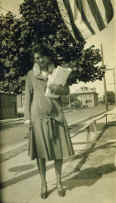
Edna Rhen outside the Alpha, New Jersey Post Office |
About
this time Evelyn Frantz went to live with her uncle, Cleveland Rhen, in Alpha,
New Jersey, where she worked in the Post Office with Cleve's wife Edna Rhen, who
was Postmaster in Alpha. She also attended Churchman's Business College in
nearby Easton, PA, where she took commercial courses. I received a letter asking
me to visit her there in Alpha. She later denied sending it and said that her
cousin, Virginia Rhen, had sent it and forged her name. However, one morning I
embarked on a journey to Alpha by trolley car for a visit. It was necessary for
me to change trolleys at least ten or twelve times, but, fortunately, each
trolley line met another line which continued in the same direction. I arrived
at the Alpha Post Office just as Edna and Evelyn were closing the office and
going home. I went with them and stayed overnight and returned home the next
day.
|
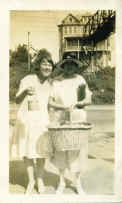
|
Evelyn Frantz & Edna Rhen after closing Post Office
in Alpha, NJ 1926
|
I
next was hired by the George R. Gorgas drugstore at 16 North Third Street across
the street from the telegraph office. The drugstore was always open, the only
drugstore open all night. My shift was from 11:30 p.m. until 8:00 a.m., and my
duties included waiting on customers at the soda fountain, cleaning the
fountain, cooking various flavors on the gas stove in the basement and refilling
the different containers in the soda fountain, mopping the marble floor in the
store, filling pill boxes with pills, filling bottles with patent medicines and
putting labels on them and helping the pharmacist to fill prescriptions when
necessary.
This
was during the Prohibition era, and no liquor was sold except by a doctor's
prescription for medicinal purposes. Since this was the only drugstore open at
night, many patrons brought their prescriptions in for whiskey. We did not carry
any in the store as other druggists did, because Dr. Gorgas was a teetotaler and
would not handle it. This druggist, Dr. George Gorgas, was a brother of the Dr.
Gorgas who succeeded in wiping out the yellow fever in the Canal Zone during the
building of the Panama Canal, thus saving the builders from abandoning the
project.
While
working in the George A. Gorgas drugstore, we had the members of the C. Lloyd
Major Orchestra come into the store for refreshments at the soda fountain while
on their way home from dance engagements at other cities around the state. It
usually was about 3 a.m. when they came in. I served C. Lloyd Major a caramel
sundae and the caramel seemed to have a lump in it which he presumed to be sugar
until he saw legs sticking up. It turned out to be a roach that had gotten into
the syrup I had cooked in the basement. I had to dump the contents of that bowl
down the drain and cook a new batch.
Another
time after an engagement at the State Theatre, a magician named Blackstone sat
up to the soda fountain and ordered an ice cream soda, then asked for pretzels.
I replied that we did not sell pretzels and he said, "What is that on the
back bar?" I turned around and saw a small plate with several pretzels on
it. I served them to him and to this day don't know where they came from.
Perhaps it was some slight of hand on his part.
Note
by Rae Neubaum:
At
some point while he was working at the drugstore, my Dad went back to Swatara
Township High School fulltime. He used to tell us how he'd go to high school on
the trolley after working all night in Harrisburg, and the trolley driver would
wake him up when they got to the school in Oberlin.
|
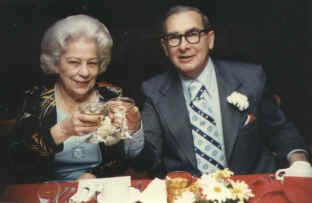
Bob
& Evelyn at their 50th Anniversary party in 1978 |
Unfortunately,
we never got my Dad to write more of his life story. He married my mother
(Evelyn Frantz) at age 18 in 1928, and they were married 58 years, until
she died in 1986. The following year he married Jane Kautz, who died in
1999. My Dad used to tell people that the second time he was married
"only 12 years." He died in 2001 at the age of 91.
Although
he did a lot of job-hopping as a boy, after he married, my Dad started to
work at the Harrisburg Post Office, retiring from there 43 years later. He
then worked for about 10 years in the office of the Harrisburg Postal
Employees Credit Union, in the same building--he said he had gotten so
used to going there every morning that it was hard to give it up.
My
Dad was very active in the Credit Union movement in Pennsylvania,
beginning in 1933 with the establishment of the credit union at the
Harrisburg Post Office (now Postmark Credit Union on Linglestown Road) and
continuing for 7 decades of volunteer service to credit unions. In his
credit union career his duties ranged from clerking in the office to
Chairman of the Board of the Pennsylvania Credit Union League, the
statewide credit union association in Pennsylvania.
|
|
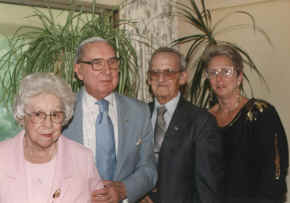
Jane & Bob Neubaum with his brother Charlie and his wife Shelda
Neubaum on the occasion of Bob's retirement from the board of Pennsylvania
Central Federal Credit Union
|
|

We always teased my Dad about this picture--we called it the Hair Picture.
It was taken about 1929.
|
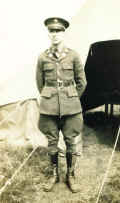
Bob at National Guard (probably at Mt. Gretna) camp circa 1930
|
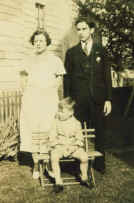
Evelyn and Bob Neubaum with son Bob circa 1932
|
|
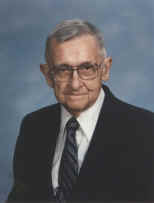
Bob's older brother Bill in later years
|
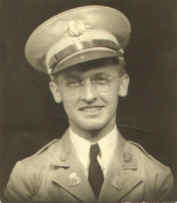
Bob's younger brother Charlie in uniform
|
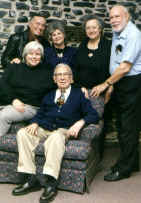
Bob Neubaum at his 90th birthday party with (from left to right) daughter
Rae, stepson Brud Alexander and his wife Mary, and son Bob with his wife
Mildred |
|
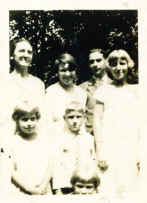
|
Please help me identify the other people in this
picture! It was probably taken around 1928-1930.
The ones I recognize are
Back row: Mary Amanda Millhime Neubaum, Evelyn May Frantz Neubaum,
Robert Fred Neubaum, BUT WHO IS THIS YOUNG WOMAN?
Front Row: WHO ARE THE 3 KIDS? |
Updated 09-1-2003
Write to Rae at raeneubaum@aol.com



